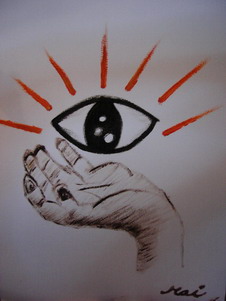
On behalf of all the people of Tibet, I would like to thank all those
who have taken an interest in the culture of Tibet and its traditions,
both spiritual and secular. I thank you for all you are doing to make
sure these traditions do not disappear.I am going to speak today
of peace of mind. The reason Tibetan culture is so important-at least,
it seems to me-is that our culture has great potential for promoting
peace of mind. During the extremely difficult period we have known
recently in Tibet, one of the factors which has helped us to remain
determined and not lose hope is this aspect of our own culture.
Our civilization is such that it has allowed us to preserve our serenity
and our inner peace in spite of all the trials and difficult situations we
have known. Recently I have had more and more contact with Western
scientists and we have been speaking about the frustration experienced
by human beings and of various possible remedies for that frustration.
The scientists questioned me at length about the mental health and
state of mind of Tibetan people, and they were very surprised to discover
that despite all the trauma the Tibetans have experienced, they manage
to preserve a stable mental state. This has been observed in particular
among those who spent long years in Chinese prisons and labor camps.
I would like to share with you an example. The associate abbot of
the Nanigyal monastery, who was recently exiled to India, was imprisoned
in I959, then sent to a Chinese labor camp-he was incarcerated a total
of eighteen years. After he reached his monastery in exile,
we had a chat together. He told me of his life and his experiences.
He mentioned that while he was in the hands of the Chinese,
he was in great danger for the following reason: he explained that
he almost lost the compassion he felt for his torturers.
I found this remarkable!
I often tease this man, telling him that despite all those difficult years
spent at the mercy of the Chinese, his face has hardly changed.
Although he is older than me, I believe he has even less white hair
than I do-you probably can't see mine today,
I shaved my head this morning! Above all, he has kept his wonderful smile.
All this is possible, or so it seems to me, because of Tibetan and Buddhist culture.
Perhaps my modest experience might serve as an example.
As a Buddhist monk, I have been trained in the practice,
the philosophy, and the teachings of Buddhism, but not at all
with the view of having to cope with the demands of modern life.
I have had to handle enormous responsibilities. I lost my freedom
at the age of sixteen, and my country when I was twenty-four.
For thirty-four years I have lived in exile, a refugee in a foreign country.
All this time, while we have been working for the exiled
Tibetan community, our country has known immeasurable destruction
and suffering. Despite all this tragedy I find that as far as
my mind, peace, and serenity are concerned, I am not doing too badly.
On occasion tourists come back from Tibet or from the refuge camps in
India with the false impression that Tibetans can't have suffered all that
much because they seem very happy and are always smiling.
This misconception is the only disadvantage of our mental attitude.
How can we develop inner peace and serenity in our mind?
I think human nature is basically good. It is true that we are also
made up of jealousy and hatred, but nevertheless
I believe our dominant characteristics are affection and kindness.
From the first day of our lives until our last breath,
the very foundation of our existence is affection and human warmth.
It is a well-known fact that children raised in an affectionate
family have greater success in developing their human qualities,
while those who grow up in the absence of the favorable
conditions of love and compassion end up with a far more negative
behavior in life and create tension wherever they go.
The absence or the presence of compassion and love in a family
therefore has a very obvious effect. According to doctors and scientists,
a calm mental state is a critical factor in a person's health. In addition,
from the first weeks of life, physical contact, whether with the mother
or someone else, is of prime importance for the awakening and development
of the child's brain
-oOo-
(นักแปลฝึกหัดๆ)
ความเมตตา
ท่านทะไลลามะองค์ที่๑๔
ข้าพเจ้าในนามตัวแทนของชาวธิเบตทุกคน
ขอขอบคุณทุกคนที่ให้ความสนใจกับวัฒณธรรมและ
ขนบธรรมเนียมประเพณีที่เป็นดั่งจิตวิญญานของเรา
ขอขอบคุณท่านทั้งหลายที่ทำให้สิ่งหล่านี้ไม่จางหายไป
วันนี้ข้าพเจ้าขอพูดเรื่อง "ศานติในเรือนใจ"
เหตุผลที่วัฒนธรรม,การดำรงอยู่ของพวกเรานั้นสำคัญมาก
อย่างน้อยก็สำหรับฉันเอง-มันเป็นสิ่งที่มีคุณค่า
และสนับสนุน ความสงบ ศานติ ในจิตใจ
ถึงแม้ว่าหลายปีที่พวกเราได้รับความเจ็บปวด
ที่เกิดขึ้นในธิเบต แต่ปัจจัยเหล่านั้นก็ช่วย
ทำให้พวกเรายังคงมีมุมมองแน่วแน่
และไม่สิ้นหวังต่อ วัฒณธรรมของเรา..
อารยธรรมของเราได้ให้เรารักษาความสงบ
และสันติภาพภายในจิตใจ แม้ว่าจะต้องเจอ
กับเหตุการณ์ที่ลำบาก
เมื่อเร็วๆนี้ ฉันเองได้พยายามเพิ่มการติดต่อ
กับนักวิทยาศาสตร์ชาวตะวันตกหลายๆท่าน
เราก็ได้คุยกันเกี่ยวกับเรื่อง ความผิดหวังผู้คน
และหนทางอันเป็นไปได้ที่จะเยียวยาความทุกข์ใจนั้น
ในที่สุด ก็มีนักวิทยาศาสตร์ถามฉัน
เรื่องสุขภาพใจและสภาพจิตใจของชาวธิเบต..
พวกเราได้ค้นพบว่า บาดแผลทั้งหมดที่ชาวธิเบต
ได้รับนั้นคือ ประสบการณ์ การฝึกฝน
และคงสภาพจิตใจที่มั่นคงไว้ได้
โดยเฉพาะผู้ที่ได้รับการทารุนในคุกของชาวจีน
ฉันอยากจะแบ่งปันตัวอย่างให้กับคุณ
เกี่ยวเนื่องกับเจ้าอาวาสของวัดNanigyal
ซึ่งเขาได้ถูกเนรเทศให้ไปอยู่ในอินเดีย
เขาถูกขังคุกในปี 1959 และถูกส่งไปอยู่ที่
เรือนจำใช้แรงงานของชาวจีน
เขาได้ถูกกักขังเป็นเวลา18ปี
หลังจากเขาถูกเนรเทศมาอยู่ที่วัดในอินเดีย
เราได้พูดคุยกัน เขาได้เล่าเรื่องราวต่างๆที่ผ่านมา
เขาได้กล่าวถึงเหตุการณ์ที่ตกอยู่ในมือของชาวจีน
ว่าเกือบเขาจะหมดความเมตตา
เนื่องจากความเจ็บปวดที่แสนสาหัส
ฉันมักจะหยอกเขาเล่น
และบอกกับเขาว่า ไม่ว่าอย่างก็ตาม
หลายปีที่ยากที่จะใช้ความเมตตากับชาวจีน
หน้าตาของเขาก็ดูจะไม่สูงวัยขึ้น
แม้ว่าเขาจะแก่กว่าฉัน
เขามีผมขาวน้อยกว่าที่ฉันมี
บางทีคุณอาจไม่เห็นของฉันในวันนี้
ก็ฉันเพิ่งโกนไปตอนเช้านี่เอง!!
และวิธีนี้ไม่เสียหลาย
เพราะทำให้เขายิ้มได้อย่างน่าอัศจรรย์
มันคือวิธีของชาวธิเบตและวิถีแห่งชาวพุทธ
บางทีประสบการ์เล็กๆของฉัน
อาจจะทำให้เป็นแบบอย่างได้
การเป็นพระ ก็ทำให้ได้ฝึกฝน
เรียนรู้ หลักปรัชญาและหลักธรรม
ของพระพุทธเจ้า แต่นั้นก็ไม่ใช่ทั้งหมด
เรายังต้องมองความเป็นไปของยุคสมัยใหม่ด้วย
ฉันจำเป็นต้องจัดการกับสิ่งซึ่งไร้ศีลธรรม
ฉันเกิดความสูญเสียตั้งแต่อายุ๑๖
๒๔ ปี ๒๔ปีมาแล้วที่ต้องลี้ภัยออกจากประเทศของตน
ไปอยู่ต่างประเทศ ตลอดเวลาที่ผ่านมา
ขณะที่ฉันทำงานโดยตั้งเป็นรัฐบาลพลัดถิ่น
ประเทศของเราได้ขึ้นชื่อว่าอยู่ในภาวะของการถูก
ทำลายและความเจ็บปวด อย่างไรก็ดี
เหตุการณ์เลวร้ายนั้นทำให้ จิตใจที่สงบของฉัน
เป็นกังวล แต่มันก็ไม่แย่นัก..
นักท่องเที่ยวที่กลับมาจากธิเบต
หรือจากค่ายลี้ภัยในอินเดีย
ได้รับความเข้าใจกลับมาอย่างผิดๆ
คือ ชาวธิเบตไม่สามารถทุกข์ใจได้มาก
เพราะ ดูเหมือนพวกเขาจะมีความสุข
และยิ้มตลอดเวลา
ทำอย่างไรที่เราจะสามารถพัฒนาความสงบ
และแจ่มใสภายในจิตใจได้?
ฉันคิดว่าพื้นฐานธรรมชาติของมนุษย์นั้นดี
มันเป็นความจริงที่พวกเราสร้างความอิจฉา
ความโกรธ ด้วยตัวเราเองแต่ว่าอย่างไรก็ตาม
พลังของลักษณะพิเศษที่เหนือกว่า
จะทำให้เกิดความรักและความเมตตา
ตั้งแต่วันแรกที่พวกเราลืมตา
จนกระทั่งหมดลมหายใจ
รากฐานของการดำรงอยู่นั้นคือ
ความรักและความอบอุ่นของมนุษย์
ความจริงที่เราพบก็คือ
เมื่อเด็กได้รับการเลี้ยงดูอย่างอบอุ่นจากครอบครัว
จะเป็นผลดีต่อการพัฒนาของเด็ก
ขณะที่เด็ก ที่ได้รับการเลี้ยงดูอย่างบกพร่องเรื่องความรัก
และความเมตตา สุดท้ายที่ได้รับคือ
การมีพฤติกรรมในแง่ลบ ,เกิดปัญหาในชีวิต
และสร้างความตึงเรียดไปในทุกๆที่
การขาดหรือการมีเมตตาและความรัก
เป็นตัวแปรที่สำคัญ
ตามที่หมอและนักวิทยาศาสตร์หลายคนได้กล่าวไว้
สภาพความสงบในจิตใจคือ
ปัจจัยทางสุขภาพของแต่ละคน
แต่ยิ่งไปกว่านั้น
ตั้งแต่ช่วงแรกของชีวิต
ความสัมพันธ์ไม่ว่าจะกับแม่
หรือคนอื่นๆ เป็นช่วงที่สำคัญที่สุด
ที่จะเป็นการปลุกและพัฒนาสมองของเด็ก
มีต่อภาค 2-------


No comments:
Post a Comment